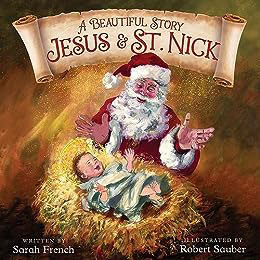 CHARLOTTE — Charlotte-based TV anchor Sarah French is used to telling stories through her role as a reporter and anchor for WCNC-TV. Recently, however, she turned her storytelling skills to the printed page to help children get back to the Christian origins of a now secularized Christmas holiday.
CHARLOTTE — Charlotte-based TV anchor Sarah French is used to telling stories through her role as a reporter and anchor for WCNC-TV. Recently, however, she turned her storytelling skills to the printed page to help children get back to the Christian origins of a now secularized Christmas holiday.
“I was looking for a book for my kids that told the story of Jesus’ birth but also explained the origin of Santa Claus in the very real person who was St. Nicholas, and I couldn’t find one,” French said. “So, I decided to write my own.”
The result is her new, colorful children’s book “A Beautiful Story: Jesus and St. Nick,” which tells the narratives of both Jesus’ birth and the life of St. Nicholas. Born in the third century to a wealthy family, the early Christian bishop became known for his tradition of distributing his family’s wealth through secret gift-giving to the needy, which eventually evolved into the modern secular figure of Santa Claus, or, more affectionately, “St. Nick.”
“I have two kids and I love history, so I enjoy teaching them about why we celebrate certain holidays and traditions,” French said.
“I was amazed people didn’t realize that St. Nicholas was a real person. I wanted my kids and others to know that the man behind the tradition of Santa Claus was a real follower of Christ.”
She first wrote up the story about two years ago, using a scrapbooking website to create the layout she envisioned for the book.
French eventually got connected with illustrator Robert Sauber, who worked with her to bring her initial visions to life on the printed page.
Released Sept. 12, the book also explores the origins of common holiday traditions such as hanging up stockings and the Dec. 6 feast day of St. Nicholas, which includes the custom of children leaving their shoes outside their doors so the visiting saint can leave gifts in them.
“When I first held the book, I remember thinking that I hope it’s a blessing for the people who read it,” French said. “The heart of the story is both Jesus and St. Nicholas, a man who thought about other people and gave to other people. My goal is to have my kids show Christ’s love to others – that’s our job as parents – and I hope this book can help teach other kids not only about our traditions, but also a lesson about sharing and giving.”
 French’s late grandmother, who passed away in March, was one of her main inspirations for the book because she was a strong woman of faith who loved Christmas, often keeping her decorations up all year long, French said.
French’s late grandmother, who passed away in March, was one of her main inspirations for the book because she was a strong woman of faith who loved Christmas, often keeping her decorations up all year long, French said.
The book is currently available online through Amazon and Barnes & Noble and will soon be on sale at select local bookstores.
— Christina L. Knauss
 NEW YORK — Life in plastic may be fantastic but the tedious ideology-driven comedy "Barbie" (Warner Bros.) is not. Although genuinely objectionable elements are relatively few, moreover, this is distinctly not a movie for the age group to which the figurine of the title is primarily marketed.
NEW YORK — Life in plastic may be fantastic but the tedious ideology-driven comedy "Barbie" (Warner Bros.) is not. Although genuinely objectionable elements are relatively few, moreover, this is distinctly not a movie for the age group to which the figurine of the title is primarily marketed.
Margot Robbie plays the famous Mattel doll that first arrived on store shelves back in 1959. Together with her sidekick Ken (Ryan Gosling), Barbie inhabits a pink-hued feminist paradise where the president, the nine justices of the Supreme Court and all Nobel Prize winners are women.
Troubled and bewildered by hitherto alien thoughts of death as well as by a sudden physical imperfection -- a patch of cellulite on her leg -- our heroine consults one of her many alter egos, Weird Barbie (Kate McKinnon). The problem, it seems, is that whoever is currently playing with Standard Barbie is sad and her sorrow is affecting her toy.
So it's time to journey to the real world to meet the cause of the difficulty and, presumably, cheer her up sufficiently to restore the status quo. Ken stows away in the back seat of Barbie's car and thus gets to share in the adventure.
Arriving in Los Angeles, Barbie discovers the tribulations -- and Ken the joys -- of patriarchy. Barbie also learns to her surprise that, far from being revered as a symbol of female empowerment, she's reviled as the embodiment of women's subjugation.
Ken manages to return to Barbie Land first and proceeds to imbue it with male dominance. Thus, by the time Barbie gets back to her natural setting, it's not only been tainted by warped values but turned topsy-turvy.
Barbie will need the cooperation of all her many eponymous iterations to avert cultural and political disaster. Fortunately, she'll also have the help of Gloria (America Ferrera) and Sasha (Ariana Greenblatt), a mother-and-daughter duo from the realm of human beings.
As scripted by director Greta Gerwig and Noah Baumbach, the picture bemoans the plight of women while blithely stereotyping men as selfish, childish and aggressive. With the rivalry of the sexes raging, little of the humor (Will Ferrell plays the dizzy CEO of Mattel) and less of the sentiment (Rhea Perlman plays the wise granny who co-founded the company) works.
Despite all the controversy that continues to swirl around her, Barbie has undeniably proved a long-lasting source of enjoyment for youngsters. Her namesake movie, by contrast, is too closely focused on its own agenda to provide older viewers with much entertainment and too freewheeling to be acceptable for little kids.
The film contains stylized physical violence, a few instances each of mild swearing and crass talk, mature wordplay and brief sexual and anatomical humor. The OSV News classification is A-II – adults and adolescents. The Motion Picture Association rating is PG-13 – parents strongly cautioned. Some material may be inappropriate for children under 13.
— John Mulderig, OSV News. John Mulderig is media reviewer for OSV News. Follow him on Twitter @JohnMulderig1.

